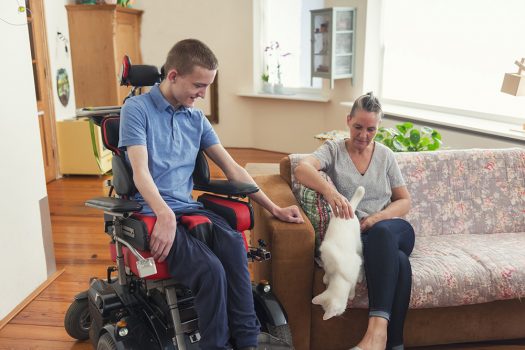
At Ability Action Australia, our NDIS registered Occupational Therapy services are all about supporting you to obtain the best possible outcomes for you, your family and your support people.
Our NDIS Occupational Therapists are genuinely committed to helping you reach your goals. Sometimes, this means being creative and adaptable in the way we deliver our services so that you can get more out of life today.
Below, we’ve highlighted just some examples where Occupational Therapy has provided the support that NDIS participants need, when they need it.
When you need NDIS Occupational Therapy as soon as possible
Normally, our local Occupational Therapists will come to you at your home, or you will come to us at one of our clinics, because we try to make the process of delivering positive outcomes for you and your family as simple as possible.
Recently, a woman from Hobart reached out to Ability Action Australia for occupational therapy services. Her son lives with cerebral palsy, and had been on a waiting list for more than a year for an Occupational Therapy appointment to arrange for an upgraded commode.
The commode was more than 10 years old and extremely unsafe for him, his mum, and their support workers. He would slip out of its old rubber foot straps, and the outdated seat design made it hard to safely complete the necessary showering and toileting.
As access to an Occupational Therapist in Hobart would take a few more weeks, a different model was offered. One of Ability Action Australia’s Senior Occupational Therapists based in Brisbane would become the primary therapist, working in close collaboration with a Hobart-based Therapy Assistance who would support the mother and son face to face on the ground and act as the Senior OTs “eyes and ears”. This meant that distance was no longer an issue and the right support could be delivered.
The Senior OT researched a number of commodes, selecting three options that she thought would work well. She then called a Tasmanian-based equipment company to arrange for a trial.
Mum and son, along with our Therapy Assistant, met at the company’s showroom to trial the equipment, and linked in with the Senior OT via video call so that she could supervise and ensure the prescribed equipment was fit for purpose.
After trialling a commode with a modern design, mum and son were very happy to proceed, and our Senior OT prescribed a long-handled sponge to make washing even easier. This is a great example of collaborating to make change possible, overcoming even the tyranny of distance to provide access to Occupational Therapy services.
When hospital should not be a home
After spending nearly a decade in a secure mental health unit of a Sydney hospital, one of our NDIS participants is finally set to move into supported housing, where she can improve her quality of life.
Since childhood, she has lived with schizophrenia, a complex brain disorder that affects 1 in 100 Australians and causes psychotic symptoms such as delusions. She has required a high level of support within the hospital’s psychiatric unit for extreme behavioural challenges, including physical and verbal aggression, and violent outbursts.
After being referred to Ability Action Australia for Occupational Therapy services, our Senior OT was very concerned about the length of time that she has been living in hospital and wanted to explore alternative accommodation options.
Working closely with the hospital’s social worker, she met with the participant several times to assess her care requirements for living independently. She also performed a specialist disability accommodation assessment to determine an appropriate home.
While the first meeting lasted just five minutes because of the participant’s behavioural challenges, a rapport and trust built between the OT and our participant and the next few meetings ran very smoothly.
Following the assessments, our OT recommended that her participant: live alone to avoid harming others, with the assistance of two support workers; live in a house free of any breakables, for her own safety and that of others; have access to a group facility to increase her social skills over time; and engage with a behavioural support specialist who would develop a behavioural support plan as an alternative to restrictive practices such as sedation.
After six months of waiting, the NDIA approved all of her recommendations for the participant, and they also found a suitable home. She is now receiving positive behaviour support to reduce her challenging behaviours and improve her quality of life.
After being in hospital for years, the participant can now start her journey into supported housing and rehabilitation. She can start to develop her own routine and achieve some of the goals in her NDIS plan.
When you need longer time to make the right decision for you
One of our participants was in desperate need of a pressure care mattress, but hadn’t been able to arrange a trial for anything longer than three days, which wasn’t long enough to properly test the mattress.
She had three unsuccessful trials of pressure care mattresses, which had all been too noisy or too bulky, and her mum, with whom she co-slept, was starting to despair.
Our Occupational Therapist needed to act fast to find a suitable mattress as the participant, who lives with cerebral palsy and has no voluntary movement, had painful pressure sores on her hips and heels.
On the advice of another member of our therapy team, she located a reputable supplier of specialist mattresses and requested an extended trial of a Zephair Paediatric Pressure Care mattress, which features air chambers that alternately inflate and deflate to evenly distribute pressure.
She also ordered a smaller mattress that is quieter, fits perfectly alongside her mum’s bed, and features a foam overlay for extra support and comfort.
The participant was granted an extended trial of two weeks, rather than three days, allowing her and her mum plenty of time to test it out. The mattress was found to both actively heal her pressure sores and offer a comfortable surface.
Now, after being approved by the NDIA, our participant is sleeping soundly in her own bed for the first time.
Find out more
If you would like further information or to speak to us about our NDIS Occupational Therapy Service, please contact our friendly concierge service on 1800 238 958 or complete the request contact form and we will contact you at a time that suits you best.

